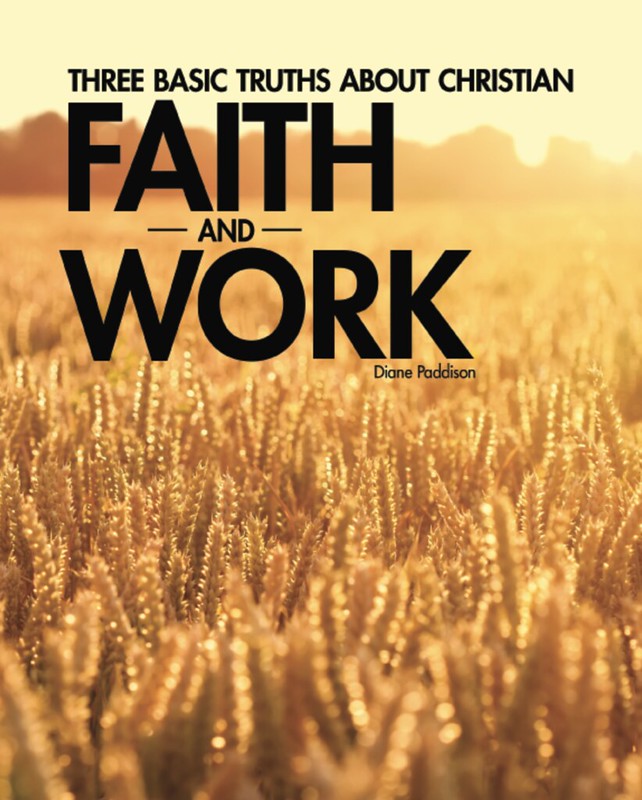Jubilee: Three Basic Truths About Christian Faith and Work
Blog / Produced by The High Calling
“How do I bring my faith to work?“ you ask. If you are showing up to work, then your faith is too.
It really is that simple. It’s not a question of how to bring faith to work because your faith is part of you. How your faith plays out in the workplace is much less about your strategy for showing it to people and much more about the health of your personal relationship with Jesus Christ.
To integrate your work and your faith, you need to recognize three basic truths.
1) All work is God’s work.
When people ask, “How do I bring my faith to work?” they presuppose a dividing line between “spiritual life” and “work life;,” between “God’s work” and “secular work.” Such distinctions can all-too-often be reinforced by well-meaning Christians. Many churches subtly promote a similar view of the world, highlighting the obedience and the faith and sacrifices of foreign missionaries and others who work full-time in traditional ministry fields.
God isn’t confined to the “ministry” sector, and neither is his important and purposeful work. Every time you do what God has called you to do, it honors him, whether you are worshiping on Sunday or filing documents on Tuesday.
When I started out in commercial real estate, much of my work didn’t seem particularly meaningful—paperwork, spreadsheets, and endless meetings that sometimes felt meaningless. But as my understanding of the work developed and I started to build relationships with clients and coworkers, I sensed the impact my work could have on people’s lives. Whatever I do, whatever you do, the people around you are children of God. When we strive to treat them with kindness and honor and respect, it ministers to their souls.
Gradually, my career advanced until I was overseeing 4,500 employees directly and nearly 30,000 employees indirectly as a member of the Global Executive Board of CBRE.
At the time I thought, “This is it! This must be the big opportunity that God has been preparing me for.” But even in that big impressive-sounding role, the greatest impact I had for God continued to come from small things like working hard, behaving honorably, and building relationships with the people around me.
2) We are built for a purpose.
God has endowed each of us with a useful purpose and a mission. Every part of you was fearfully and wonderfully made (Ps. 139). All too often, I see young people making important decisions about their profession or career path based on convenience, social approval, or pure earning potential.
At various stages of my career, I’ve made it a point to critically assess (or reassess) my personal and professional strengths, weaknesses, and goals. Through reflection, outside assessments like Strengths Finder 2.0, consultation, and focused prayer, I’ve identified strengths in relationship-building and practical problem-solving. I’ve realized that I thrive best in collaborative environments that call for open communication. I’ve established workplace values that are critical to me, such as respect for my faith and my family focus.
Understanding myself in these ways helps me to be more effective with my time and energy because I can distinguish between opportunities that will give me life and ones that will drain me. In so doing, I am better able to steward the gifts and resources that God has given me.
3) Bring God Pleasure.
In perhaps the most famous line from the Academy Award-winning film “Chariots of Fire,” Eric Liddle, an Olympic runner, answers a challenge from his sister about why he valued athletics when he could be in the mission field: “I believe God made me for a purpose, but he also made me fast. And when I run, I feel his pleasure … to win is to honor him.” Eric Liddle did what he believed himself born to do, as well as he could do it, because he knew it brought God pleasure.
Can I let you in on something? Your purpose is not really about the work itself. The work is important, make no mistake, and we are instructed to work excellently in the name of God (Col. 3:17). But wherever God has called you to direct your efforts, our work is an act of obedience to God reconnecting us with the redemption of God.
This is the true power and freedom of Christians in the workplace. Marketplace culture incentivizes cutthroat competition; it is dominated and constrained by profits and losses, by desire for acclaim and self-protectionism. Even for those who do succeed, a career can only offer finite resources. But God’s grace knows no bounds. Christians have the freedom to go “all out,” and to make mistakes because we have the gift of grace. We have the freedom to choose the right—or better—thing over the expected one; to turn down a promotion that is wrong for your family or to offer forgiveness or support to a colleague who maybe doesn’t deserve it.
Your responses to difficult situations and your attitude towards work will say more to people about your faith than words ever could. Focus on fulfilling your role in God’s creation, and your life’s work will be an opportunity to bring glory to our creator.
______________________________
Jubilee: Everything Matters
For the past seven years, The High Calling has supported the Jubilee Conference, an annual gathering of thousands of college students learning how to worship God with their whole lives. Whether a person is interested in engineering and science or art and music, law and politics or medicine and mission, justice and families or college life and the years to come, Jubilee has someone speaking about what it means to be involved in those places faithfully. This week, The High Calling offers a special collection of articles, videos, and reflections to serve the students and campus ministers who attended Jubilee. Join the Jubilee and learn how to worship God with your whole life.
Featured image by Marquette University. Used with Permission. Source via Flickr. Faith and Work graphic from the Jubilee 2015 conference booklet sponsored by The High Calling.\.






